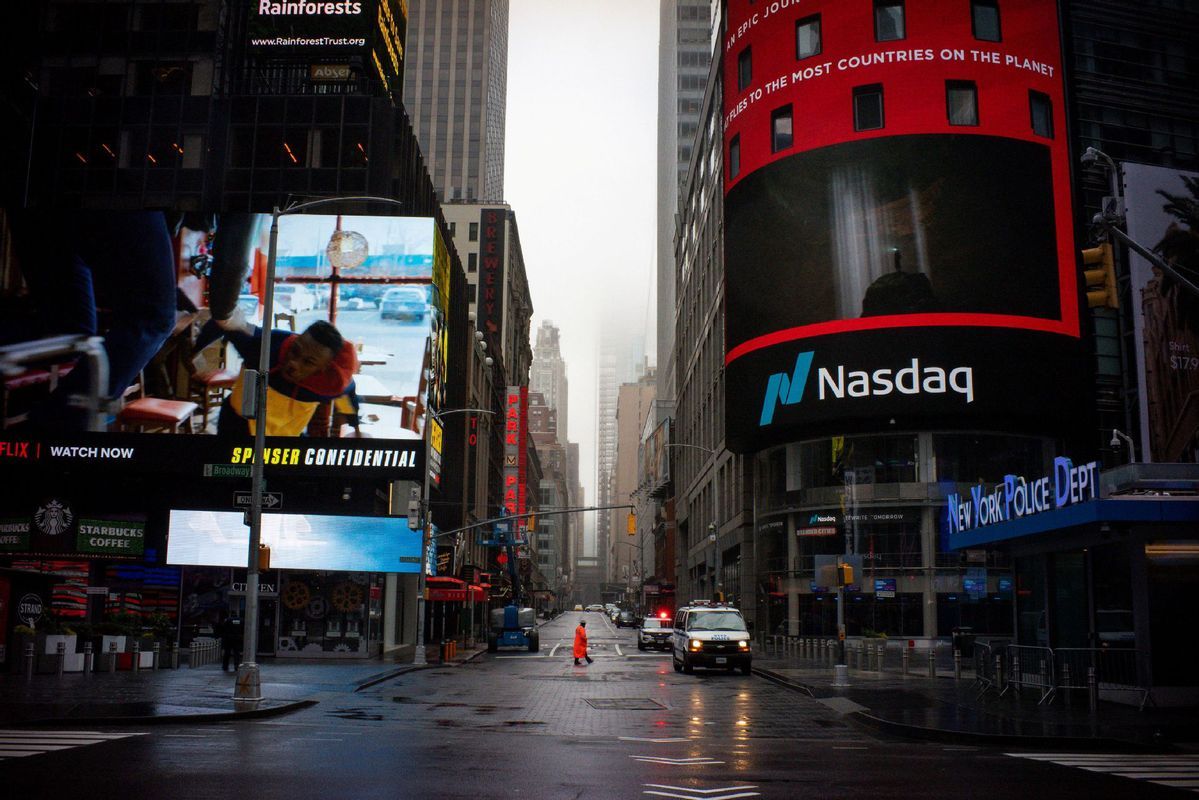
The 43rd St in Manhattan, New York City. (Photo: Agencies)
With many of New York City's streets depleted of tourists and office workers due to the COVID-19 pandemic, the ranks of street vendors — many unlicensed —have risen, leading to conflict with beleaguered established businesses.
The situation also has become increasingly political, with both groups having vocal backing.
And starting on Jan 15, the New York Police Department will no longer oversee enforcement of street vendor regulations. That responsibility will shift to the city's Department of Consumer and Worker Protection (DCWP).
"Our officers must be able to focus on the real drivers of crime," Mayor Bill de Blasio said. "Having Department of Consumer and Worker Protection coordinating the city's vending policy and enforcement efforts strikes the right balance as we rethink how law enforcement resources are used in our city. DCWP has a strong record of protecting New Yorkers, and I'm confident they're up to the task."
On two streets in areas with large numbers of Chinese immigrants— Main Street in Flushing, Queens, and Fifth Avenue in Sunset Park, Brooklyn — vendors jostle for space.
Main Street was jammed recently with vendors selling crabs, fruit, cheap jade trinkets and Chinese antiques.
DianSong Yu of the Flushing Business Improvement District told the New York Post that he estimates 90 percent of the vendors aren't licensed.
"It's a very tough time for everybody; we get it," Yu told The Post. "But we need to be fair to the local merchants who are paying very high rent and taxes. And they're hurting."
The Street Vendor Project, based in Manhattan, advocates for the sidewalk sellers.
"There are more than 10,000 street vendors in New York City — hot dog vendors, flower vendors, book vendors, street artists, and many others. They are small businesspeople struggling to make ends meet. Most are immigrants and people of color," the group's website says.
"They work long hours under harsh conditions, asking for nothing more than a chance to sell their goods on the public sidewalk. Many streets have been closed to them at the urging of powerful business groups. They receive $1,000 tickets for minor violations like vending too close to a crosswalk."
From January through Dec 21, complaints about street vendors in the city's five boroughs totaled more than 2,900, despite the city being in lockdown for 78 of those days, the Post reported. In the first nine months of 2020, the NYPD issued 28 tickets to unlicensed vendors compared with 173 in all of 2019.
A City Council measure proposed in 2018 would gradually double the approximately 5,100 street-vending permits. A permit cap has been in effect since 1983.
"Street vendors are our neighborhood fruit and produce carts, halal stands, and breakfast trucks," City Council Member Margaret Chin, one of the prime sponsors of the bill to increase the licenses, said in a statement earlier this year. "Every day, they withstand the rain, snow, and sweltering heat to feed our communities."
City Council Speaker Corey Johnson told politico.com that he supports the bill and expected it to come up for a vote next year.
On Dec 9, investment bank Morgan Stanley and anti-poverty organization Robin Hood announced a commitment to provide financial assistance to 2,000 street vendors across the city, in partnership with The Street Vendor Project.
The funding will provide at least $1,000 to each vendor. Morgan Stanley has made a $2 million commitment, and Robin Hood is donating $375,000 and will be assisting with grant management and cash distribution.
James Gorman, chairman and CEO of Morgan Stanley, said: "New York City street vendors are a central part of the cultural fabric of New York City. With our headquarters in Times Square, many of our employees rely on these vendors for their morning coffee or a quick lunch. Morgan Stanley is committed to supporting those in our community that support us on a daily basis as they face unprecedented economic hardship."
But as the pandemic persists, discord between storefront operators and the vendors likely will continue.
The expansion of restaurants and other businesses onto sidewalks, such as heated, covered spaces to facilitate "outdoor dining" amid the pandemic, also has heightened the potential for standoffs between the two sides.
"I don't think right now is the best time (for the license expansion)," Jeffrey García, president of the New York State Latino Restaurant Bar and Lounge Association, told ny1.com. "We need to help our brick-and-mortar places come back from this pandemic."
"It's an absolutely dire situation, and we need to ensure we're not creating an environment that's going to pose more challenges towards brick-and-mortar restaurants," Andrew Rigie, executive director of the New York City Hospitality Alliance, told politico.com. "They can't get up and move across the street or move to a different neighborhood like vendors can — they're stuck where they are in long-term, expensive leases."
Jessica Walker, president of the Manhattan Chamber of Commerce, told politico that the City Council should not rush a bill that was introduced two years before the pandemic. She said there has been an "explosion in the number of street vendors" since the start of the coronavirus outbreak.
"From a small-business point of view, there were always concerns about an unlevel playing field," Walker said. "There are street vendors who are selling fruit and produce right outside of a grocery store. It seems like there's this unfairness inherent to what's happening right now."
City Councilman Peter Koo introduced a bill passed two years ago that banned all vending, including food carts, on Main Street in Flushing.
"It's a circus," he told the Post, of the current situation. "This falls squarely on the mayor."
"We remain committed to a diverse commercial ecosystem, where small businesses of all kinds coexist and contribute to a vibrant street life," mayoral spokeswoman Laura Feyer told the Post.


